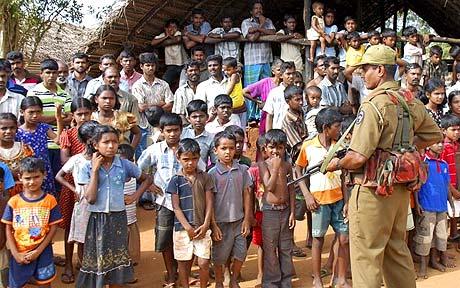Indian delegation visits Vavuniya camp
 The visiting Tamil Nadu parliamentary delegation to Sri Lanka on Sunday called for the release of the displaced people in camps in Vavuniya, the restoration of democracy and a political solution to the conflict.
The visiting Tamil Nadu parliamentary delegation to Sri Lanka on Sunday called for the release of the displaced people in camps in Vavuniya, the restoration of democracy and a political solution to the conflict.
In an address made at the Jaffna library this morning head of the visiting delegation T. R. Balu said a political solution is necessary to resolve the conflict which had lasted for more than 25 years, Daily Mirror newspaper’s online edition reported from Jaffna.
Kanimozhi, daughter of Tamil Nadu Chief Minister M. Karunanidhi, said that the Tamil people should not shed tears anymore, the displaced people should be reunited with their families and democracy restored in the country.
According to the report, Jaffna Fisherman’s societies meanwhile handed over a petition to the Tamil Nadu delegation urging their intervention over Indian fishermen poaching in Lankan waters. The Tamil Nadu delegation assured they will take up the issue with the Indian Central government.
The delegation was slated to visit refugee camps after the Jaffna visit.
The delegation for reasons not known has been kept away from the media, including the Indian media, based out of Colombo.
Meanwhile, President Mahinda Rajapajksa-led United People's Freedom Alliance (UPFA) on Sunday secured an absolute majority in the Southern Provincial Council (SPC), for which election was held on Saturday.
The UPFA bagged 38 (including bonus seats) seats in the 65-member House.
The outcome of SPC election was followed by observers keenly for three reasons. It is the last of the eight of the nine provinces in the island nation to go polls since the Eelam War IV, August
2006 to May 2009. Rajapaksa hails from the Hambantota area of the southern province. An election to the office of the President followed by general election before April is on the cards after the SP election.
Reacting to the outcome the UNP General Secretary Tissa Attanayake said as the government could only garner 67 percent of the votes as opposed to the expected 90 percent despite `blatant violation of electoral laws and massive use of state resources’. “This is the beginning of the end of the Rajapaksa regime”, he remarked.